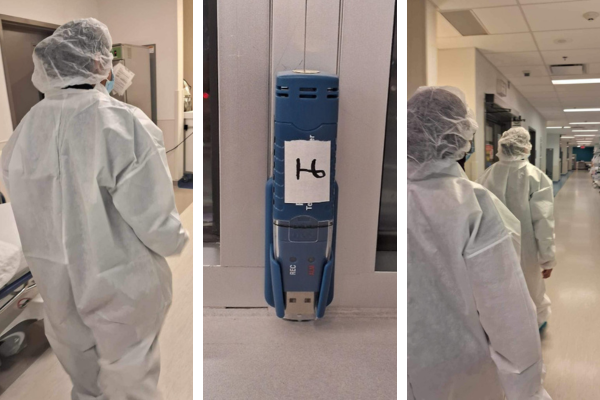Innovative student project targets energy efficiency at the Glen
Sustainable healthcare is a growing priority, and energy efficiency plays a crucial role in achieving it. A research project by three graduate students from McGill University’s Experimental Surgery Program has discovered a potential strategy for the MUHC to optimize its energy use.
Students inspired to think outside the box
.png)
Students Devangi Patel, Aksa Anwar and Urshila Naithani explored various ideas to introduce innovation into a hospital setting as part of their Surgical Innovations class. They wanted their study to have a focus on sustainability. As part of a larger study led by the Technical Services Directorate, the students were asked to study the potential energy savings from lowering humidity levels in the heating, ventilation, and air conditioning (HVAC) systems in the perioperative area, excluding the operating suites. “We wanted to find ways to optimize energy consumption in this particular hospital setting,” says Devangi. The Canadian Standards Association recommends humidity levels range between 30 and 60 per cent. The levels at the Glen, prior to the study, hovered around 45 per cent. “For our project, we reduced the humidity by three percent every two to three days,” explains Devangi.

The results are promising. By reducing humidity levels gradually, the students recorded a savings of seven-megawatt hours over three days – equal to the electricity use of 75 homes in a year. “We now have a margin to manoeuvre to adjust the ambient humidity level according to the conditions outside. We'll definitely be making savings, and this project is closely aligned with our sustainable development goals and priorities,” says Yannick Guénette, Associate Director, Operations and PPP Agreement
“This is an interesting avenue to explore,” says Devangi. She refers to a similar study at Vall d’Hebron Hospital in Spain, which found a 30 per cent reduction in total energy use in the surgery unit (temperature, ventilation and lighting) resulted in an annual savings of €150,000.
Collaboration and future steps
This project highlights strong teamwork among various departments and external stakeholders, and it was also a stroke of good fortune. As luck would have it, Technical Services was studying ways to increase energy savings at the Glen site. The Research Institute’s Clinical Innovation Platform (CLIP) was also eager to discuss new research ideas after a conference last November, which was attended by Nicolas Robert, Director of Financial Resources. “It was a serendipity moment. Denis Bastien with Atkins Réalis (public-private partnership, PPP) wanted to pursue a special project and CLIP also reached out, so we matched the two stakeholders,” says Amanda de Rosa with Performance and Sustainable Development. “The students collaborated with the PPP and Glen Technical Services to study potential energy savings. We appreciate their commitment and effort as well as those of CLIP.”
Located at the Montreal General Hospital, CLIP supports the development of new health technologies. It provides services such as clinical consultation, industry expert mentorship, marketing and product trials, rapid prototyping and laboratories for product development.
The MUHC plans to collect data throughout the summer. The findings may serve as a basis for renegotiating its PPP contract. “Moving forward this project could be applied beyond the operating suites to see how energy consumption can be optimized in other places as well,” adds Devangi.
For more information on the CLIP program, visit https://rimuhc.ca/clinical-research/clinical-innovation-platform-clip
